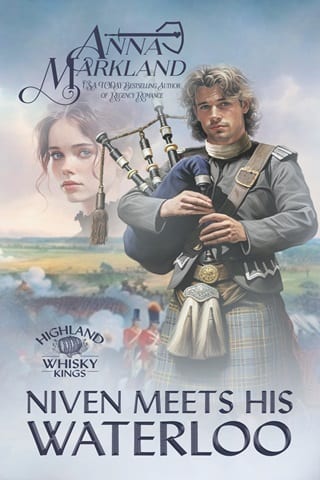Wellingtons Dispatch
LONDON, JUNE 22ND 1815
K enneth Hawkins, Duke of Ramsay, crumpled his newspaper and rose so quickly from his seat in the breakfast nook that the chair tumbled backwards. "Never mind that," he told the startled footman trying to right his chair. "Gather everyone in the drawing room, including the servants. Tell them it's urgent. There's news from the front."
Arriving before anyone else, he quickly re-read Wellington's dispatch printed in the London Gazette . Most of it was superfluous military detail he needn't pass on, and there was no direct news of the people he and his guests were concerned for. However, he hoped the crux of the dispatch would bring a measure of relief to everyone who would soon gather to hear it.
Twenty minutes later, he surveyed the anxious faces of friends, family and servants. His cousin, Tavish King, and his wife, Piper, had arrived from Scotland the previous day. Livid when told of Niven's abduction and transportation to Europe, Tavish had to be physically restrained from traveling to Withenshawe Manor to assault the duke.
In the drawing room, Willow Halstead sat on the settee holding Piper's hand. She'd fled her father's house when he confessed his and her brothers' roles in Niven's disappearance.
Kenneth's wife and sister had never been close but now Cat and Daisy sat together, holding hands.
Jock stood behind Kenneth's mother, his hands on Lady Maureen's shoulders.
The household staff gathered around the periphery of the room.
"What I'm about to read to you won't lessen our concerns for our loved ones," Kenneth began. "But much of the news from Europe is good. It's the Duke of Wellington's dispatch written on June 19 th to the Earl of Bathurst after two hard-fought battles with the French at Quatre Bras and a place called Waterloo." He cleared his throat and began.
Buonaparte advanced on the 15th and attacked the Prussians.
I did not hear of these events until the evening of the 15th; I immediately ordered the troops to prepare to march.
The enemy continued his progress towards Bruxelles; and, on the same evening, the 15th, attacked a brigade of the army of the Netherlands and forced it back to a strategic crossroads south of Bruxelles, called Les Quatre Bras.
I directed the Anglo-Allied army to march upon Les Quatre Bras . The enemy then commenced an attack upon Prince Blücher and the Prussians with his whole force, excepting the 1st and 2nd corps, and a corps of cavalry, with which he attacked our post at Les Quatre Bras .
We maintained our position, and completely defeated and repulsed all the enemy's attempts to get possession of the crossroads .
His Royal Highness the Prince of Orange, the Duke of Brunswick, and Lieut. General Sir Thomas Picton, and Major Generals Sir James Kempt and Sir Denis Pack highly distinguished themselves.
"I won't read the whole list of commanders he mentions," Kenneth said. "But Kempt, of course, commanded the Eighth Brigade. Willow's brothers would have fought under him. Wellington singles out the 28th, 42nd, 79th, and 92nd regiments, and the battalion of Hanoverians, but there's no mention of the 32 nd ."
Tears welled in Willow's eyes.
"Get on wi' it," Tavish urged, earning a glare from his wife.
The position in front of Waterloo crossed the high roads from Charleroi and Nivelles. In front of the right centre, we occupied the Chateau Hougoumont, and in front of the left centre we occupied the farm of La Haye Sainte. Blücher had promised me that, in case we should be attacked, he would support me with one or more Prussian corps, as might be necessary.
At about ten o'clock on the 18 th , the enemy commenced a furious attack upon our post at Hougoumont and I am happy to add that it was maintained throughout the day with the utmost gallantry by these brave troops, notwithstanding the repeated efforts of large bodies of the enemy to obtain possession of it.
Kenneth paused. "He goes on to describe heavy fighting and cavalry attacks which I'll not go into now. Suffice it to say, the battle went on all day until the evening."
These attacks were repeated till about seven in the evening, when the enemy made a desperate effort with cavalry and infantry. I determined to attack the enemy, and immediately advanced the whole line of infantry, supported by the cavalry and artillery. The attack succeeded in every point: the enemy was forced from his positions on the heights, and fled in the utmost confusion, leaving behind him, as far as I could judge, one hundred fifty pieces of cannon, with their ammunition, which fell into our hands.
I continued the pursuit till long after dark, and then discontinued it only on account of the fatigue of our troops, who had been engaged during twelve hours, and because I found myself on the same road with Marshal Blücher, who assured me of his intention to follow the enemy throughout the night. He has sent me word this morning that he had taken 60 pieces of cannon belonging to the Imperial Guard, and several carriages, baggage, belonging to Buonaparte.
Such a desperate action could not be fought, and such advantages could not be gained, without great loss; and I am sorry to add that ours has been immense.
"He goes on to list the principal officers who were killed, and mentions the important role of the Prussian army in securing victory."
"So," Tavish said after a lengthy silence. "Napoleon is defeated. I should feel like celebratin', but we still don't know what became o' Niven."
"Nor how Rowan and his brothers fared," Daisy said with a sigh.
Willow gripped the kerchief she held. "Seasoned veterans fell at Waterloo and Quatre Bras. If Niven was somehow caught up in these terrible battles, what hope exists for a man who wasn't a soldier?"
 Fullepub
Fullepub 



